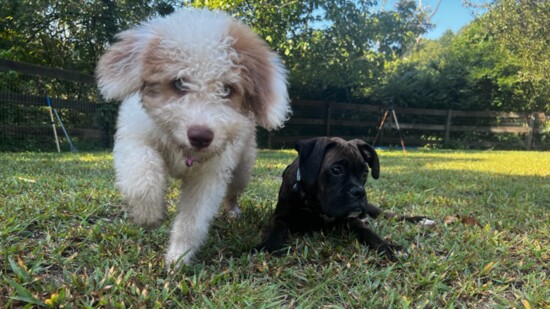This holiday season, some families will bring a puppy home as a gift for themselves or their children. Along with the joy of having a new dog in the house, there’s also the responsibility of raising that puppy to fit into the family dynamics in a safe and loving way.
So, what should people know before bringing a puppy into their home to ensure it's the right decision? “One of the things to think about is how much energy, time, and finances are going to be committed to that puppy to help it develop,” says Ayelet Berger, who, together with co-owner Julie Farris, operates Instinct Dog Behavior & Training Nashville. “Those first several weeks and months are so critical.”
Before teaming up in September of 2021, Ayelet and Julie each ran their own dog training companies. They believed that combining their knowledge and experience would have a greater impact for present and future clients. Both are certified dog trainers with additional certifications, including one from Family Paws®, an internationally renowned organization.
The two women have helped countless families with dogs of all ages, especially with puppies, which can often be just like newborn human babies. Having to get up in the middle of the night, potty training, and feeding are all part of the schedule. Beyond that, people need to think about how they’re preparing for that puppy, especially if they have children.
“From day one, start to teach through modeling appropriate safe behaviors around dogs,” she says. “It’s important to give them the respect, love, and space that they need.”
Sometimes, it’s hard for the average person to know what’s right and wrong when it comes to puppy raising. Sometimes, what seems like the appropriate thing to do or is innocuous can actually have some significant long-term behavioral effects on the dog, explains Ayelet.
“If the puppy has an accident, they might punish it in some way, whether by yelling at it or pushing its nose into its pee. But, instead of learning it shouldn't pee inside the house, it learns it should hide when it pees, so then it's harder to find. Or, we often see that sometimes what happens is the puppy really has no idea what the owner is mad about, and the puppy starts to feel that this human is not predictable, and if they're not predictable, maybe they're not safe. There could then be a fracture in the relationship, which can lead to distress, increased anxiety, and aggression.”
Their team of experts will instead teach the puppy and their owners the most effective and loving way to train their puppies. Everyone at Instinct Dog Behavior & Training Nashville who works with the dogs has at least one national and/or international certification, which is not always the case with other facilities. “Our industry is not regulated at all – anyone can call him or herself a dog trainer,” she says.
Depending on the type of training people are looking for when it comes to their puppies’ development, there are three main programs available. “We have what people traditionally think of as dog training, which is having the trainer come to the home, do that initial consultation assessment, start to work with the puppy and their families, and then develop a training program for them.” They usually meet once a week and then have a certain number of follow-up lessons.
Then there are their puppy board and train camps for puppies who are five to ten months of age. “We currently take up to three puppies at a time at our puppy center in Goodlettsville so we can have playgroups,” says Ayelet. “This is where we're doing some foundational work like walking nicely on a leash or greeting visitors politely and calmly.”
The program that is the most unique, she says, is their puppy-raising program. Puppies between the ages of nine weeks and up to five months stay in trainers’ homes for various lengths of time, depending on what they need. “The trainers, or puppy raisers as well call them, are getting up in the middle of the night doing potty training, working on getting the dog comfortable with crates, doing body handling, and providing exposures that are appropriate for socialization.”
During this time, puppy parents can watch videos and access notes online. When finished, the trainer lets the parents know what the puppy likes and dislikes in order to enable a smooth transition back into the home.
“We've received some amazing feedback on this program and have developed nice relationships with our clients,” she says. “So, if they do have any problems in the future, they can just pick up the phone and call us.”
“We've received some amazing feedback on this program and have developed nice relationships with our clients.”
“One of the things to think about is how much energy, time, and finances are going to be committed to that puppy to help it develop.”
